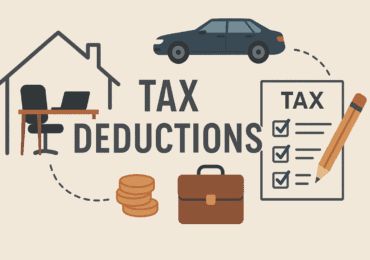Running a small business is demanding, and taxes can feel overwhelming. Diligently exploring tax deductions is crucial for profitability. Professional accountants in Phoenix are invaluable partners in navigating tax laws.
The Home Office Deduction: More Than Just A Desk
For many modern small business owners, the lines between work and home have blurred. If you regularly and exclusively use a portion of your home for business purposes, you might be eligible for the home office deduction. This deduction isn’t limited to a dedicated room with a desk; it can also include spaces for storing inventory or meeting clients.
To qualify, the area must be your principal place of business or where you meet with clients or customers in the normal course of your business. You can calculate this deduction using either the simplified method, which allows a standard deduction per square foot, or the actual expense method, which involves tracking direct and indirect expenses related to your home office. Remember to keep thorough records, including square footage calculations and documentation of business use, to support your claim.
Vehicle Expenses: Tracking Your Business Miles
You can deduct the associated expenses if you use your vehicle for business, such as meeting clients, running errands, or attending conferences. The standard mileage rate and the actual expense method are two primary methods for calculating this deduction. The standard mileage rate is a per-mile rate set by the IRS each year, simplifying record-keeping.
The expense method involves tracking the actual costs of operating your vehicle for business, including gas, oil changes, repairs, insurance, and depreciation. Maintaining a detailed mileage log and documenting the date, purpose, and number of miles driven for each business trip is essential. Choosing the method that yields the largest deduction while adhering to record-keeping requirements is a smart financial move for any small business owner.
Business Insurance Premiums: Protecting Your Investment
Protecting your business from potential risks is paramount, and the premiums you pay for various business insurance policies are generally tax-deductible. This includes coverage for general liability, property, workers’ compensation, professional liability (errors and omissions), and even business interruption insurance. Health insurance premiums paid for yourself, your spouse, and your dependents can often be deducted, even if you don’t itemize deductions. Carefully review all your insurance policies and ensure you claim the full deductible amount. This deduction helps offset the costs of safeguarding your business and provides a tangible tax benefit.
Startup Costs: Recovering Initial Investments
Launching a small business involves numerous upfront expenses. While not all startup costs are immediately deductible, the IRS allows you to deduct up to $5,000 in business start-up and $5,000 in organizational expenses in the year your business begins operating. These costs include market research, business plan development, legal, and accounting fees incurred before your business officially opens. Any remaining startup and organizational expenses exceeding the $5,000 limit can be amortized (deducted) over 180 months. Proper documentation of these initial expenses is crucial for claiming this valuable deduction and reducing your early-stage tax burden.
Business Interest: Borrowing For Growth
Many small businesses rely on loans or other forms of credit to finance operations, purchase equipment, or expand. The interest you pay on these business-related debts is generally tax-deductible. This includes interest on bank loans, credit cards used for business expenses, and lines of credit. Keeping accurate records of interest payments is essential for claiming this deduction. This can significantly reduce your taxable income and offset the cost of borrowing, making investing in your business’s future easier. An accountant Phoenix can help you properly categorize and deduct these expenses.
Retirement Plan Contributions: Saving For The Future
As a small business owner, you have several options for establishing retirement savings plans for yourself and your employees. Contributions you make to these qualified retirement plans, such as SEP IRAs, SIMPLE IRAs, and Solo 401(k)s, are typically tax-deductible. Not only do these plans help you save for your future, but they also provide a valuable tax break for your business in the present. The specific contribution limits and deduction rules vary depending on the type of plan, so it’s essential to understand the regulations and choose a plan that aligns with your business structure and financial goals.
Educational Expenses: Investing In Yourself And Your Team
Continuous learning and skill development are vital for staying competitive in today’s business environment. Expenses related to business education, such as attending workshops, seminars, conferences, and taking relevant courses, can often be tax-deductible. This can include tuition fees, books, travel expenses, and other related costs, provided the education maintains or improves your skills for your current business. Investing in your professional development and that of your employees can enhance your business capabilities and provide valuable tax savings.
Conclusion
Many small business owners miss valuable tax breaks, leaving money on the table. Understanding and claiming all eligible deductions is essential for financial success. Consulting with professional accountants in Phoenix ensures you maximize tax benefits.
